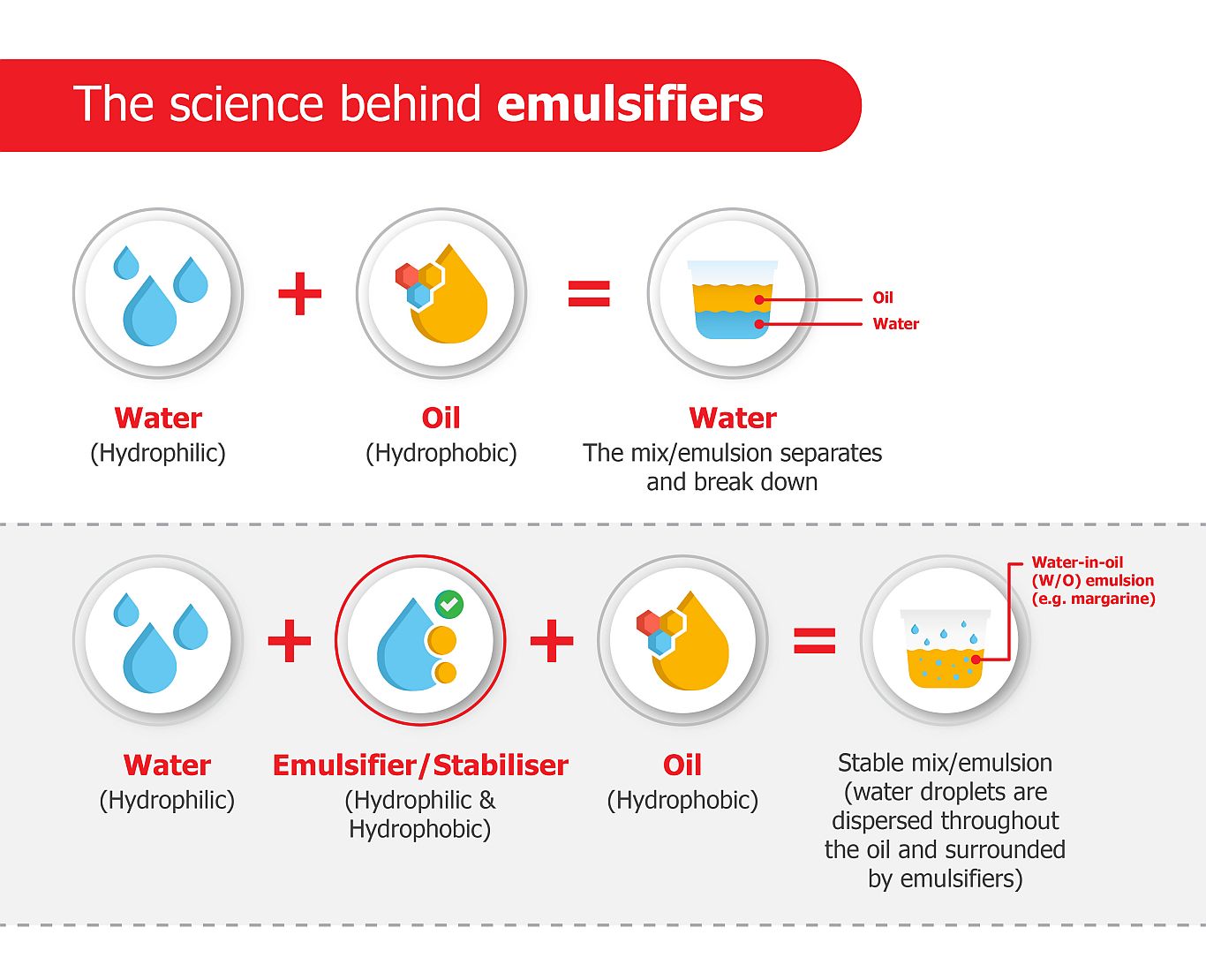The Role of Emulsifier In Food in Preventing Spoilage
All Concerning the Function of an Emulsifier in Food and Its Value in Modern Cuisine
Emulsifiers are critical in contemporary food, promoting the mix of immiscible fluids like oil and water. Their capability to support blends boosts the structure and taste of different food. From salad dressings to baked items, emulsifiers play a considerable role in both industrial and home cooking. Yet, the scientific research behind their function and the future developments in their usage continue to be less checked out. Emulsifier In Food. What more could be discovered regarding these vital culinary agents?
Understanding Emulsification: The Scientific Research Behind the Process
Although emulsification might look like an easy cooking method, it entails intricate scientific principles that are necessary for developing steady mixes of immiscible fluids, such as oil and water. At the heart of this procedure exists the idea of surface area tension, which prevents the two liquids from mixing naturally. Emulsifiers, materials that lower surface area stress, play a crucial role in assisting in the mix of these fluids. They possess both hydrophilic (water-attracting) and hydrophobic (water-repelling) residential or commercial properties, permitting them to secure themselves at the user interface in between oil and water.
When an emulsifier is presented and the mixture is upset, it forms a safety barrier around distributed droplets of one fluid within the other, maintaining the mix. This action not just improves structure and mouthfeel in food yet also adds to their visual appeal. Emulsifier In Food. Comprehending the scientific research behind emulsification is essential in modern food, permitting cooks to create a range of sauces, dressings, and emulsified recipes
Common Kinds of Emulsifiers Utilized in Food
Emulsifiers are essential active ingredients in the food market, playing an important duty in maintaining mixes of oil and water. Numerous sorts of emulsifiers are generally utilized, each with special homes suited for different applications. Lecithin, derived from soybeans or egg yolks, is just one of one of the most prominent natural emulsifiers, usually discovered in delicious chocolates and dressings. Mono- and diglycerides, which are obtained from glycerol and fats, are extensively made use of in baked products and margarine to boost structure and prolong life span. One more common emulsifier is polysorbate 80, preferred for its capability to enhance the consistency of ice lotions and sauces. Additionally, xanthan gum tissue and guar gum tissue function as thickening agents that also contribute to emulsification in gluten-free products. These emulsifiers are integral to producing a secure, palatable item in modern food formulations, ensuring an enjoyable sensory experience for customers.
The Role of Emulsifiers in Different Food Products
A selection of foodstuff rely upon emulsifiers to achieve desired structures and security. These substances facilitate the blending of immiscible liquids, such as oil and water, which is vital in lots of refined foods. In salad dressings, emulsifiers aid maintain a constant blend, preventing splitting up and enhancing shelf life. In baked goods, they contribute to an uniform crumb framework and moisture retention, boosting total quality.
Emulsifiers likewise play a significant role in dairy items, such as gelato and yogurt, where they stabilize fat beads, making sure a smooth mouthfeel. In addition, in dressings and sauces, they enhance thickness and enhance spreadability. This functionality is crucial in the production of chocolates, margarine, and mayonnaise, where a natural item is required. In general, using emulsifiers in various foodstuff is integral to contemporary food manufacturing, improving security and consistency throughout a variety of items.
Exactly How Emulsifiers Enhance Structure and Flavor

When integrated into food, emulsifiers significantly improve both appearance and flavor, producing an even more enjoyable eating experience. These substances help with the blending of ingredients that typically do not blend well, such as oil and water, resulting in a smoother, creamier uniformity. This not just enhances mouthfeel yet also enables tastes to distribute evenly throughout the product, enhancing the overall preference.

Emulsifiers in Home Food Preparation: Tips and Techniques
Just how can home chefs successfully use emulsifiers to improve their recipes? Emulsifiers play a crucial role in accomplishing desirable appearances and flavors in homemade dishes. Utilizing egg yolks in mayonnaise or hollandaise sauce allows for a steady solution, integrating oil and water properly. Home cooks can likewise explore mustard, which works as an emulsifier in vinaigrettes, guaranteeing a smooth uniformity.
In baking, including lecithin, found in egg yolks or soy, can improve dough stability and wetness retention. Furthermore, utilizing industrial emulsifiers like xanthan gum or guar gum can assist thicken sauces and dressings while maintaining a creamy mouthfeel.
When creating gelato or whipped garnishes, emulsifiers can prevent ice crystal formation, resulting in a smoother texture. By mastering these strategies, home cooks can significantly elevate their cooking developments, giving consistent and enjoyable recipes that showcase the power of emulsification.
The Future of Emulsifiers in Culinary Technology
As the cooking world proceeds to develop, the duty of emulsifiers is poised to end up being varied and progressively innovative. Breakthroughs in food scientific research are causing the growth of brand-new emulsifying agents stemmed from natural sources, which accommodate health-conscious customers and improve the sensory high qualities of dishes. Innovations such as plant-based emulsifiers are gaining traction, enabling chefs to produce vegan and allergen-free choices without compromising appearance or flavor.
In addition, the use of emulsifiers in molecular gastronomy is broadening, allowing chefs to explore one-of-a-kind structures and presentations that captivate diners. As sustainability becomes a priority, the future might see a shift towards eco-friendly emulsifiers that lower ecological effect.
Eventually, emulsifiers will certainly remain to play an important role in culinary advancement, bridging the space between practice and modernity, and permitting chefs to push the borders of creative thinking in their kitchens.
Frequently Asked Concerns

Are Emulsifiers Safe for People With Allergic reactions?
Emulsifiers can be safe for individuals with allergies, depending upon their certain sensitivities. Nevertheless, specific emulsifiers, originated from allergenic resources like soy or eggs, might cause reactions, demanding cautious component scrutiny and appointment with healthcare professionals.
Exactly How Do Emulsifiers Affect Food Life Span?
Emulsifiers boost food life span by maintaining blends, preventing separation, and minimizing microbial growth. This stability helps preserve appearance and taste in time, allowing items to continue to be secure and enticing for intake much longer than without emulsifiers.
Can Emulsifiers Be Derived From Natural Sources?
Yes, emulsifiers can be obtained from you can look here natural sources such as plants, eggs, and milk products (Emulsifier In Food). These natural emulsifiers help stabilize mixtures, enhancing appearance and uniformity in numerous food applications while being chosen for health-conscious customers
What Are the Environmental Effects of Emulsifier Manufacturing?
The ecological impacts of emulsifier manufacturing include resource depletion, Get the facts environment destruction, and air pollution from artificial processes. All-natural emulsifier sourcing can minimize some effects, however overall, commercial techniques still posture substantial ecological difficulties to ecosystems worldwide.

Are There Vegan Emulsifiers Available on the market?
Yes, there are several vegan emulsifiers readily available in the market, such as lecithin stemmed from soy or sunflower, guar gum, and xanthan gum tissue. These options accommodate plant-based diet regimens without compromising emulsifying residential or commercial properties.
Emulsifiers are essential components in the food industry, playing a crucial function in stabilizing combinations of oil and water. A range of food items rely on emulsifiers to achieve preferred textures and stability. When incorporated into food products, emulsifiers greatly improve both appearance and taste, creating an even more pleasurable eating experience. In addition, emulsifiers can maintain air pockets in whipped products like lotions and mousses, leading to a light and airy structure. Emulsifiers enhance food shelf life by maintaining blends, protecting against splitting up, and lowering microbial development.